Against the COVID tide
Jul 7, 2020

Sahni Bennett is no stranger to life’s curveballs – in fact they are a welcome challenge for the mum of seven. Still, the nationwide rāhui during the height of the COVID-19 pandemic put that mindset to the test as she watched her popular Lyttelton restaurant stall, motivation stagnate and financial resources dwindle. Kaituhi Arielle Kauaeroa asks what pearls were refined by the beating waves of the rāhui and how they kept the doors of SUPER open.
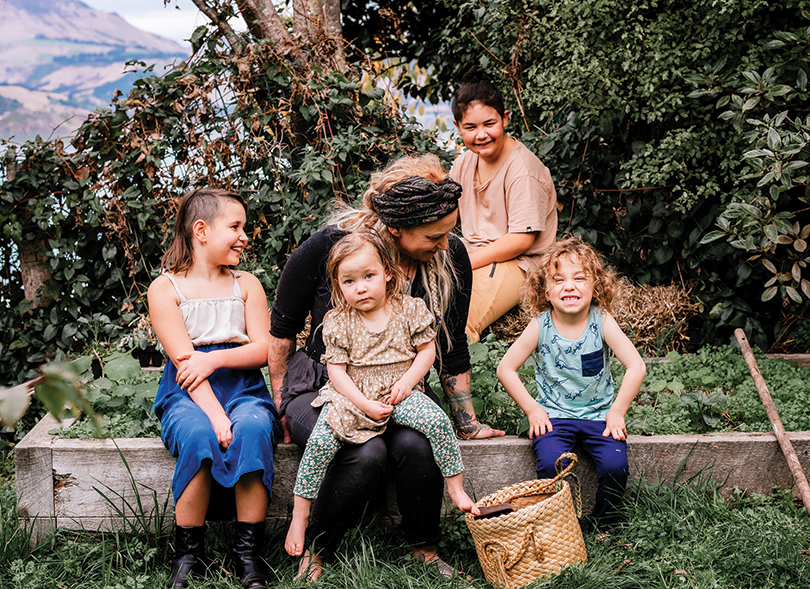
Above: Sahni in her Lyttelton vegetable garden with her four youngest tamariki: Delilah, Dune Bear, Paikea and Toi Kai Rākau.
Ruminating on the path that brought her to owning and operating a restaurant, Sahni Bennett (Ngāti Mako, Wairewa) says her success probably has a lot to do with her dogged determination to build on what existed before. At just 22, she opened her first cafe with no experience and three tamariki in tow.
“I learnt how to carry a baby and make a flat white at the same time; they’d just come along to work and were very much part of it,” she laughs.
It’s something immediately noticeable about Sahni – she laughs freely and with a joy that suits her youthful āhua. Despite never having made food for the general public, Sahni’s heart for feeding others made the outrageous leap feel like a natural step.
“I love cooking, it’s my love language. If I want to do something for someone I will cook. I might not always be able to say the words, but I can cook a mean feed.”
Her early foray into hospitality and business management resulted in two popular cafes in central Christchurch – Barbadoes and Beat Street, the latter of which she sold in 2014. However, while hospo is her world, Sahni’s seven tamariki are the central pou it orbits around. Her eldest – an actor based in Los Angeles – is 26, with four more in between him and the pōtiki, three year old twins.
“They’re everything to me. And that was the silver lining of being at home during lockdown: having time to reconnect with my kids.”
Sahni echoes a sentiment of many parents kept home for the rāhui.
“I remember on one of the first days my son asked me to help him put the head back on his dinosaur. And we sat on the steps and got into it, this head that always falls off, and we fixed it together. I don’t always have the time for those little things, between being a solo māmā and my mahi.
“Seeing the beauty in everyone again has been amazing. Because when you’re in the cogs of life, it can be easy to forget to savour the little moments. I really hope that stays, being able to slow down and see people for who they are with fresh eyes.”
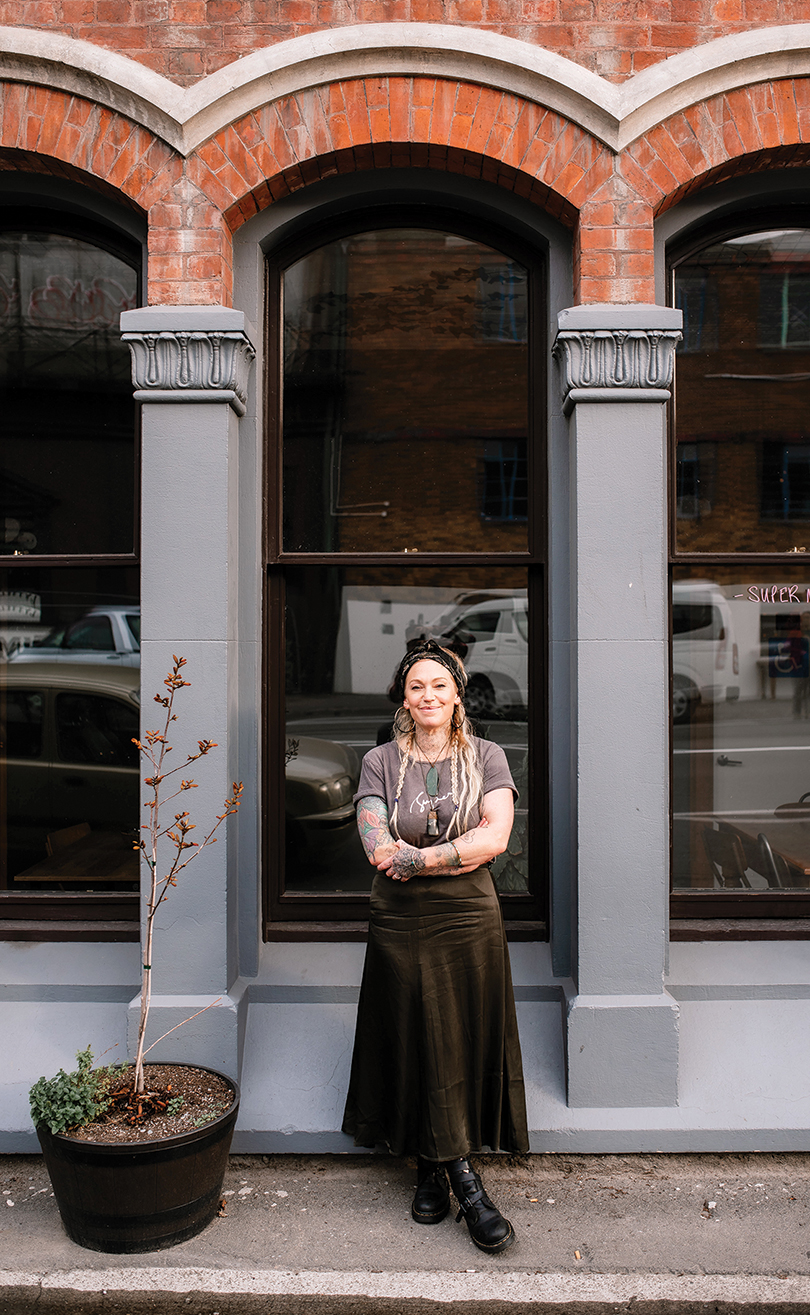
Above: Sahni Bennett outside her Lyttelton cafe SUPER.
Putting the silver lining aside, COVID-19 undoubtedly exacted a toll on Sahni, her restaurant, and every other small business owner in Aotearoa.
It took just three months from its discovery in China’s Wuhan for Coronavirus to sweep the globe, arriving in Aotearoa on February 28. Just over three weeks later, the country was in Level 4 of the government’s tiered approach to weathering the storm.
For Sahni the move from Level 2 to Level 4 was fast and confusing, with mixed messages muddying the path.
“I would be calling the Ministry of Social Development to check up on what I was supposed to be doing, and they often didn’t have the answers themselves, only because it was such a completely new situation for everyone,” she says.
“There was some comfort in knowing everyone was going through it. We did not have time to feel any kind of selfishness.”
Despite the camaraderie, Sahni describes the hit to herself and her restaurant as simply “huge”.
Although she ran a tight ship keeping things together for her staff, restaurant and home, towards the end of Level 4 things began to pile up.
“There didn’t seem to be any let-up, things were just looping,” she reflects.
“My staff lost their momentum … and that was really hard. Our staff were looked after financially, but the business definitely wasn’t supported. The only answer seemed to be to take a loan to keep the business going.”
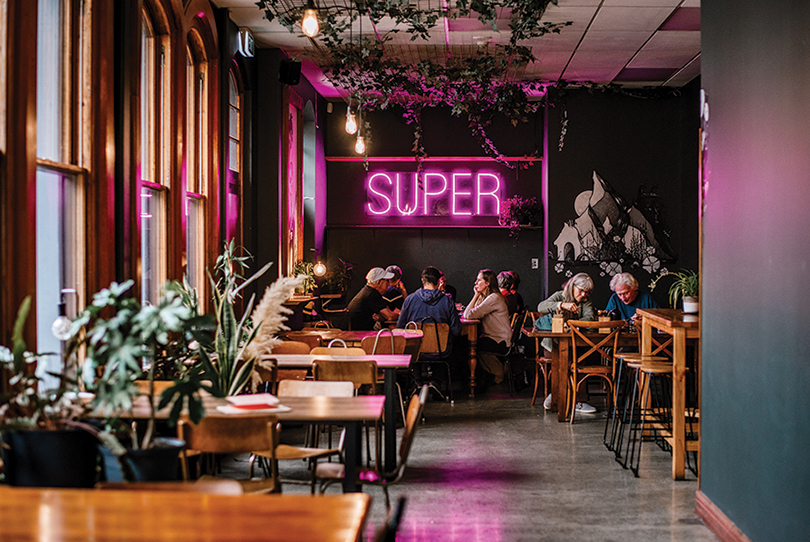
Above: A relaxed vibe is a huge part of the appeal of SUPER.
By the end of May, MSD had committed $13.9 billion to help keep staff on the books and developed a loan scheme for small business owners to access – but the increase in debt was not a viable option for Sahni.
“There was still the power to pay, the suppliers needed to be paid for the month before, all those outgoings needed to be paid with zero income. I didn’t want to add to that.”
After three days in tears, Sahni called a liquidator to discuss her options.
“In my life I’ve learned you have to get right down to get right back up. For a while there it felt like rocks were getting strapped on my back and I didn’t know which way to go. That’s the most difficult space to be in.
“I hit a real low. Then I thought ‘ah f.. k it, I have to make it work! I’ve worked too hard and I love this place so much’. So I sat in my empty restaurant and started visualising again.”
Things began to balance out at Level 3 with SUPER offering takeaways, but Sahni says even that was difficult for her and the team. Creating a beautiful meal to be popped into takeaway containers and left at the door removed the human connection, something vital to Sahni’s way of operating.
“Hospitality is too hard to do without that energy of reciprocity; things like getting complimented on the space and making people happy with your food. When that wasn’t happening it just felt soulless for me.”
And, as is often the case, the challenges didn’t end with work.
“Trying to home-school your kids at the same time, what the flip! I’m no teacher, and I’m a solo māmā too, so it was a lot of pressure.”
SUPER, the eighth child in her life, cuts an aesthetically pleasing picture on a windswept Lyttelton waterfront. It boasts high ceilings, swathes of natural light, an atmosphere that feels like home and a neon sign or two that can’t be missed.
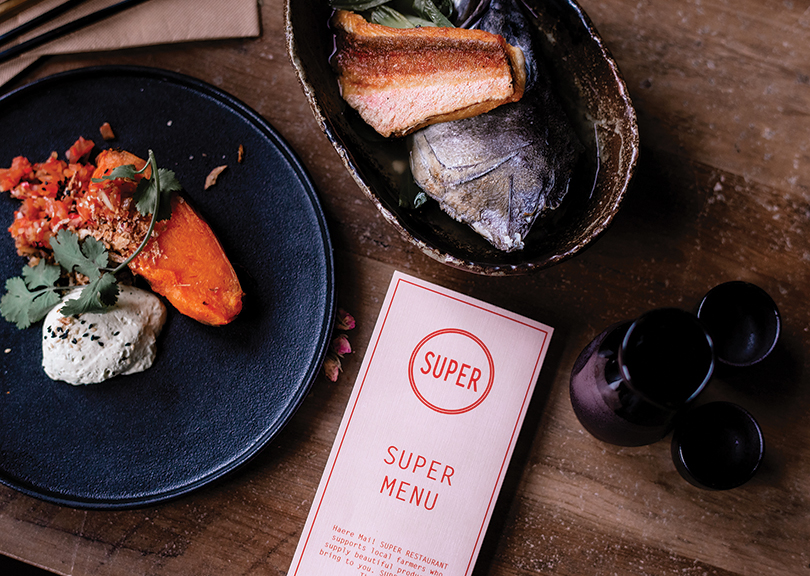
Above: A sample of the kai on offer at Super: salt baked kūmara and line caught ika in a karengo dashi broth with organic greens and foraged coastal herbs.
It was in 2017 that Sahni noticed a window sign advertising space for lease in the old building. A sketch began to form in her mind’s eye immediately, a vision for what would quickly become one of the most popular eateries in town.
“It wasn’t perfect timing, having six-month-old twins at the time, but I felt so drawn to the space. I’ve always really admired the building – it’s so beautiful and having history still standing in Christchurch is really sacred now.”
SUPER’s vibe was born from Sahni’s connection to the local whenua, coupled with inspiration from the Japanese hospitality culture she so loved observing while travelling there with her daughter.
“They are so welcoming, gentle and grateful for whoever comes through their doors, I think that’s something hospo, and particularly Christchurch, could do better. Some places take their customers for granted and I remind myself and my staff all the time: the customer is everything in what we do. ”
Kaitiakitanga shines through Sahni’s kōrero and whakaaro. Whether it’s cutting beef from the menu, using only line-caught fish or keeping ingredients local, organic and seasonal, Sahni says these decisions support the hauora of te taiao, as well as helping customers connect with what they’re eating and be present with the kai.
And as her reconnection to te ao Māori has grown, so too has the flavour profile of SUPER, burgeoning to include the likes of peppery horopito and earthy kawakawa. Sahni says the fusion of Japanese and Māori ingredients works well because the dishes of both cultures are traditionally simple and not overwhelmed by competing flavours.
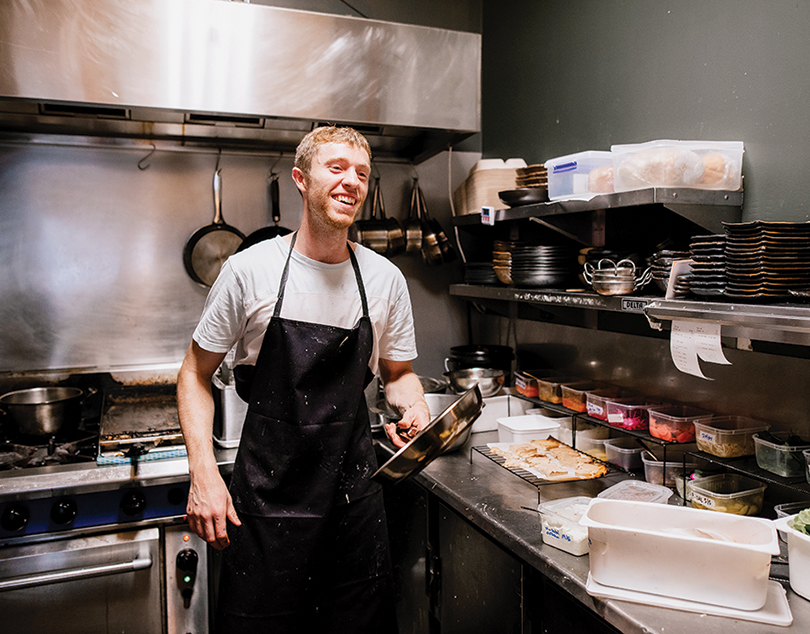
Above: Chef Joseph Dobbs at Super.
There’s a clear whakapapa to the unwritten value system which stewards SUPER. Kaitiakitanga shines through Sahni’s kōrero and whakaaro. Whether it’s cutting beef from the menu, using only line-caught fish or keeping ingredients local, organic and seasonal, Sahni says these decisions support the hauora of te taiao, as well as helping customers connect with what they’re eating and be present with the kai.
“There’s also an aspect of healing I like to think is being brought through with the whole experience. The space encourages people to slow down, connect to their food and where it’s come from.”
That manaakitanga translates well for returning customers, suppliers like local farmers at the Spring Collective, and her staff, who Sahni says keep her young.
“Taking care of my staff is really important. Ensuring they are listened to, heard and respected in their place of work is everything. I love their good ideas and I know that no one person holds all the knowledge.”
Owning a business is just one aspect of being in the hospitality industry for Sahni, who also cares deeply about sharing her own mātauranga around kai to foster wellness.
“Being completely honest, I suffer from anxiety and experience bouts of depression from time to time, and I manage that best with the kai that I consume. For me, kai is not only about energy and physical health, it’s very much about my mental health too. Our brain and our puku are so related.
“As a young woman, I had a lot of body image issues and I was quite afraid of food for a long time. I didn’t love or respect it. At about 17 I began to realise how beautiful and nourishing kai can be. I was coming into myself at that point and realising that when I was eating, it wasn’t ‘good’ and it didn’t help me to feel good about myself. As I began to love myself and nourish my body, it all just fed into wanting more goodness.”
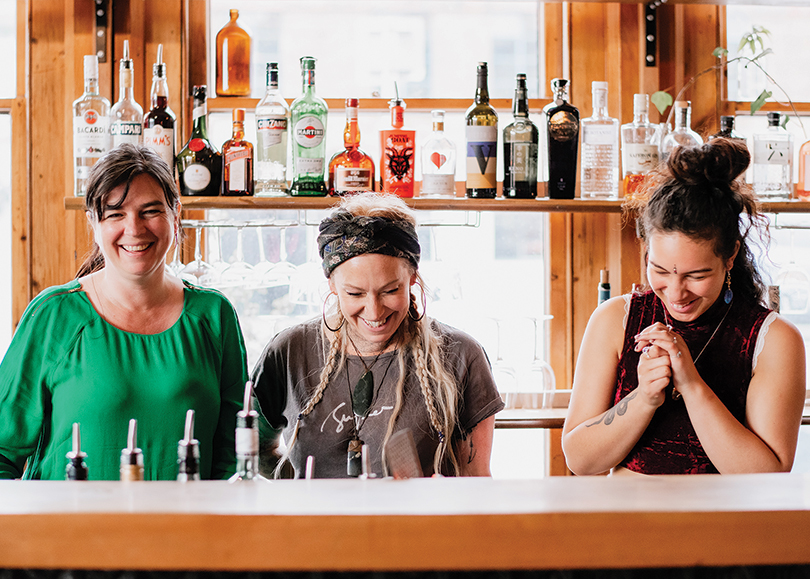
Above: Sahni with two of the many wahine that help her hold it down at Super.
These experiences have fostered a strong connection to kai as a rongoā, particularly to ease the passage of teenage-hood. Her theory? If it worked for me, it could work for others – and so a moemoeā quietly smoulders.
“My biggest dream (alongside SUPER) is to get some land, put in a māra kai and run a 12-week course for rangatahi. For the kids who are growing up eating noodles, eating white bread and that’s it. When we grow up like that it’s all we know, until we are shown,” she says.
“I’d love to be able to dig the garden, teach them about raising seeds, growing kai, harvesting and creating beautiful kai. I’d love to take them to wineries and introduce ideas about healthy relationships to alcohol, how it can be paired with food.”
It’s a dream that started to take shape the more Sahni connected to her taha Māori, slowly revealing how her work could serve more than the hospitality industry.
“I was really disconnected from my Māori side for a long time, and it wasn’t until my father passed away that I started to search a little more. It’s such a different time to be able and allowed to reconnect [than previous generations],” she says.
“At the end of the day, my Māoritanga is unravelling and I feel more connected every day.”
Working with rangatahi Māori to share her mātauranga, her passion and her stories, Sahni says, could only serve to strengthen those connections.
As the nation eased into Level 2 SUPER reopened to a full house on three consecutive nights.
“It’s been so rewarding, our team is on a high. We were so touched that people chose to come to us for their first meal after lockdown. It’s really brought back that energy and life that we need.
“This is my heart. For me, there’s no better feeling than working a shift that’s busy and full, seeing people walk out the door arm-in-arm so happy with their experience and their kai. Acts of service, it’s so satisfying.”